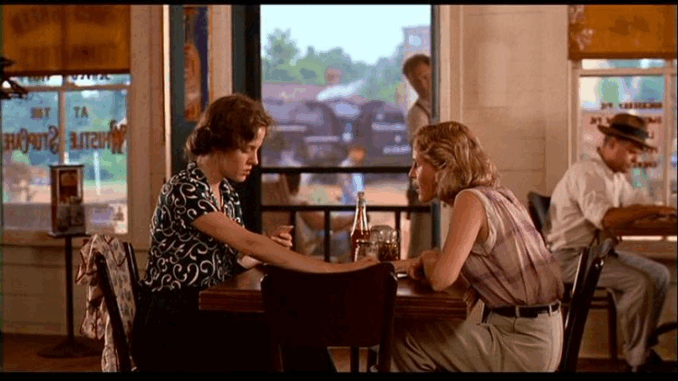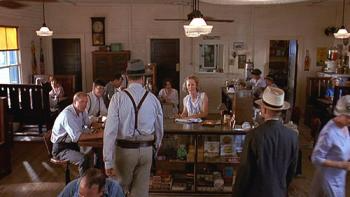
A murder mystery with more than meets the eye
One of the most gripping and tension-filled moments in Fried Green Tomatoes is the courtroom trial of Idgie Threadgoode and Big George. Accused of the murder of Ruth’s abusive husband, Frank Bennett, the trial scene is more than a typical whodunit — it’s a compelling portrait of loyalty, community bonds, and quiet rebellion against injustice.
What starts as a legal proceeding quickly transforms into a battle between truth and survival. And in true Whistle Stop fashion, the truth is layered in silence, secrets, and a shared understanding of what’s right — even when it’s not lawful.
The stakes: justice for Ruth, freedom for Idgie and George
The background to the trial is a chilling one. Frank Bennett had been violently abusive toward Ruth and had come to Whistle Stop in an attempt to reclaim his son and control over her. After a mysterious disappearance, Frank is presumed dead — and suspicion naturally falls on Idgie, the defiant, wild woman who dared to challenge him, and Big George, the gentle Black cook who loyally stood by her.
In the racially charged setting of 1930s Alabama, Big George’s life is especially at risk. The justice system is not known for fairness — particularly for Black men. And Idgie, already seen as a troublemaker by local authorities, isn’t far behind.
The unspoken alliance — community vs. the law
What makes the trial scene so riveting is the quiet but powerful way the townspeople come together to protect Idgie and George. Reverend Scroggins, a reluctant ally, provides them with a falsified alibi, while others in the community support the story without blinking.
Nobody says what really happened — but everyone understands that some men don’t deserve to come back, and that protecting one another is more important than telling the whole truth.
This scene isn’t just about legality — it’s about morality. It forces viewers to ask: What’s more ethical — telling the truth, or protecting a victim and those who defended her?
Big George’s silence speaks volumes

Perhaps the most poignant presence in the courtroom is Big George himself. He hardly speaks, but his silent strength dominates the room. A Black man falsely accused of murder, he stands as a symbol of how racism and classism intertwine in the Southern justice system.
Yet he never betrays Idgie. Not with a word, not with a glance. Their bond is beyond words — forged in years of mutual trust and respect. In that courtroom, he knows the stakes better than anyone — and yet he refuses to let fear make him falter.
Idgie’s fearless defiance
Idgie, in contrast, takes the stand with her usual rebellious spark. Her testimony is full of wit and sarcasm — a clear rejection of the authority trying to cage her. But under the sarcasm lies a burning loyalty to Ruth and Big George. She’s willing to take the fall if it means shielding them.
This mix of humor, defiance, and emotional restraint is what makes Idgie such a compelling character. She doesn’t cry or plead. She stands her ground, because that’s what love demands — not just romantic love, but love for a friend, a child, a community.
Verdict and victory — justice through solidarity
The jury finds them both not guilty. But the real victory lies not in the legal outcome, but in the unbreakable loyalty shown throughout the trial.
It’s a win for the misfits, the outsiders, and those living on the margins of Southern society. The courtroom may be controlled by the law, but Whistle Stop runs on a different kind of justice — one rooted in compassion and survival.
Echoes of modern struggles
Even though this scene is set in the early 20th century, it resonates with modern themes of systemic injustice and racial inequality. Big George’s situation is all too familiar to audiences today, and Idgie’s willingness to risk her life for a cause greater than herself feels deeply timely.
The trial is also a metaphor for how women and minorities have had to navigate justice systems not built for them. It shows that solidarity and quiet resistance can sometimes change outcomes — even if the larger system remains flawed.
Final thoughts: A scene that redefines bravery
The courtroom scene in Fried Green Tomatoes may lack Hollywood theatrics, but it’s a masterclass in tension, restraint, and emotional weight. It isn’t about discovering who killed Frank Bennett — the audience suspects the truth long before the verdict.
Instead, it’s about watching a community come together to protect one another. It’s about what happens when the law fails to deliver justice — and people decide to take that responsibility into their own hands.
In this moment, bravery isn’t shown through gunfights or speeches. It’s shown in a reverend’s lie, a cook’s silence, and a wild woman’s refusal to abandon the people she loves.
